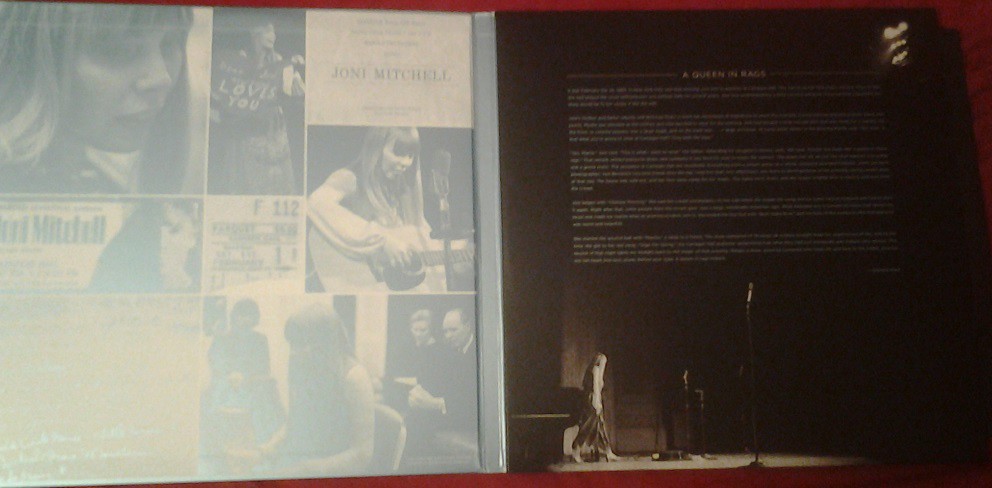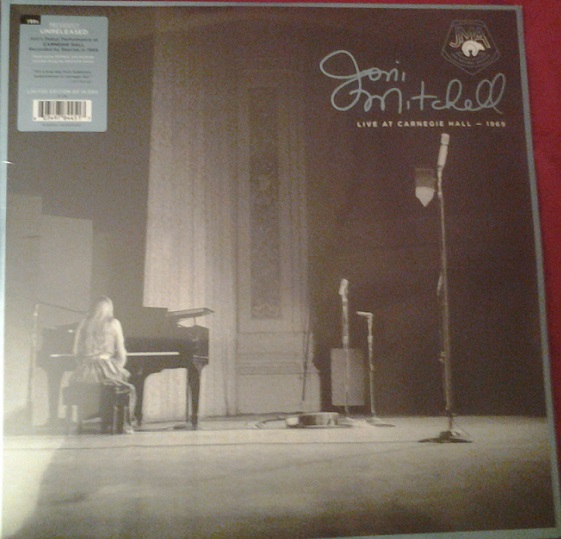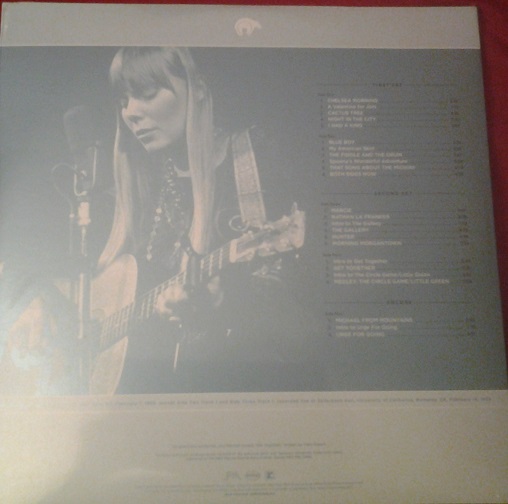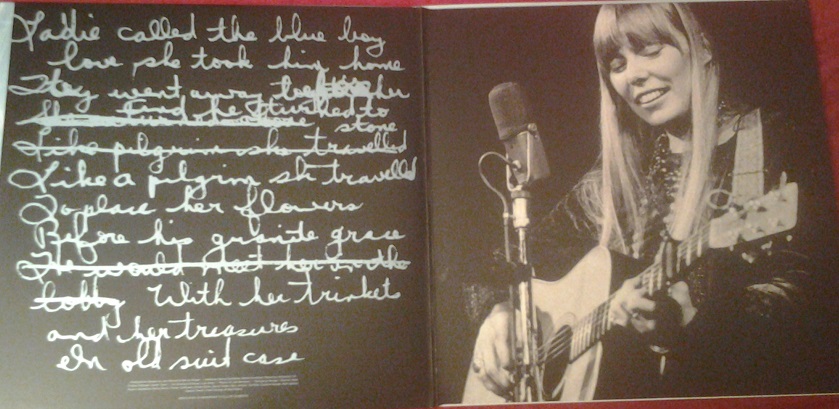Kat: Joni Mitchell. A legendary singer-songwriter, one of the finest the world has ever seen. Today, her talents are seen as immense -- as they should be. That was not, however, always the case.
In the classic "Trapped in an AA meeting with Judy Collins (Ava and C.I.)," Ava and C.I. noted how Judy Collins actively worked to undercut Joni's accomplishments. The passive-aggressive b.s. of the town drunk was due to the fact that Judy harbored real animosity towards Joni. This only became more obvious six years later with "Put The Bitch In Her Place (Ava and C.I.)" which went beyond David Yaffe's bad book about Joni to report on what wasn't in the book -- Judy Collins repeatedly trashed Joni to the author and lied about Joni and the long ago incident that still defines the relationship between the two women:
We wrote from our own knowledge about the biggest issue between Joni and
Judy -- Judy's worship of the cock has led her to repeatedly downgrade
Joni Mitchell's talents in public discussions (as well private ones).
This is not a one time thing, this is a long, long history of rushing to
praise this man or that man over Joni. Even asked about a song Joni
wrote ("Both Sides Now" -- Judy's only real hit song), Judy will avoid
praising Joni and rush to mention some male songwriter instead. (As we
noted in our example with Larry King, Judy gave the impression that
Leonard Cohen wrote the song.)
Judy Collins was a mean drunk. And she's tried to pretend otherwise in the years since.
But she was a nasty and mean drunk.
It's part of the reason she failed her son (who ended up taking his own life).
Why in the world would you take the word of a drunk over Joni's word?
Especially when this story of Newport did not begin in the 2000s, nor in
the 1990s, nor in the 1980s, nor in the 1970s but all the way back in
real time when it happened. Joni has consistently and repeatedly told
this story as she tells it today.
It is only Judy Collins who has rewritten history.
She's a damn liar and Yaffe's a damn fool.
If you're presented with conflicting stories, you first acknowledge that
both can be right. People have different perspectives and that's why
eye witness testimony -- even when witnesses tell the whole truth -- can
contradict.
You then look to see who is more believable.
Has one person stuck to the same story for decades?
Okay, then they usually get the benefit of the doubt.
This is especially true when, for years, Judy publicly credited Tom Rush
with calling her up and telling her he was with a songwriter and she
had to hear this song ("Both Sides Now") that the songwriter had
written.
For years, Judy told that.
She even printed that in a book.
Only after Tom Rush publicly made a point to note (repeatedly) that it
was not him, it was Al Kooper, did Judy 'remember' it correctly.
Wet brain.
If two stories conflict, you investigate.
Judy did not meet Joni Mitchell in April of 1967.
That's a flat out lie.
Was that too much for Yaffe to check out?
Or how about this little fact: The event at Newport wasn't in August, as Judy tells Yafee.
It was July 16, 1967.
Where was Joni in April and May?
Detroit.
With soon to be ex-husband Chuck Mitchell.
Was that too hard for Yaffe to check out.
Al Kooper. That's who called Judy, remember?
Joni met him in the summer of 1967 -- that would be after the "April" in Judy Collins' latest 'recovered memory.'
Most importantly, there is one witness to the Judy-Joni phone call: Al Kooper.
And he has publicly backed Joni's version. "I asked her [Judy Collins]
to take Joni in her car with her to Newport, listen to Joni sing her
songs on the ride, and see if she could find a spot on the bill for
her," he told Sheila Weller for her book GIRLS LIKE US: CAROLE KING,
JONI MITCHELL, CARLY SIMON -- AND THE JOURNEY OF A GENERATION.
Not content to call Joni a liar, Yaffe also takes Joni to task for not
liking Judy's version of "Both Sides Now." He huffs that she took the
money for it. Yes, and David Bowie took his royalties for copies of
Barbra Streisand's BUTTERFLY but he still didn't care for her cover of
his "Life On Mars." (To ROLLING STONE's Cameron Crowe, Bowie stated,
"Bloody awful. Sorry, Barb, but it was atrocious.")
David Yaffe is a lousy writer and Judy Collins? She's just a jealous shrew. There's no other term for it. She's lied for years to avoid taking accountability for any of her actions. Her son's suicide? Just happened -- right, Judy? She's never at fault. And she loathes Joni who can actually write a song and who is a great artist. Judy's been nasty to women for years while posing as a 'feminist.' By the way, my own personal favorite portrait of 'feminist' Judy was on PBS in the 80s as they rushed around interviewing real feminists -- including women doing construction work. And then it was time to put filters over the lenses and to show Judy in her garden offering 'gospel' on the eternal feminine or some such crap. Judy's full of crap which is why she's had that long standing war with Joan Baez. It's why she's taken it upon herself to call Mavis Staples a liar. Late to that one? Years ago, Bob Dylan was attracted to Mavis. He wanted to marry her. When that story was making the rounds in the '00s, Judy felt the need to call it a lie. She felts the need to laugh at Mavis. It was really none of her damn business. But, for the record, it was true. Bob asked Mavis' father for her hand in marriage.
When you're Judy Collins, life gets rather sad.
When you look at the way that Judy has undercut other women repeatedly over the decades and the way she has repeatedly short changed Joni and Joni's talents, you start to realize that Joni had to take on a lot more than male critics and the sexists at ROLLING STONE.
I thought about that while listening to Joni's new album. I also thought about Taylor Swift. Taylor has perfected hollow songcraft. She is not an artist and it's really past time we stop pretending. She will be 32 this year -- shocking that someone of her age has accomplished so damn little -- both with music and with her life.
She can write a hook but her lyrics are empty and vapid and she's never going to be mistaken for a songwriter who moved you with real feeling. She's not much of a singer and, if she had to depend upon others to write her songs, she'd have no career. Doing the song "Mean" years ago with that limited range and coming off like Shirley Temple just doesn't cut it when she's 31.
Taylor's about craft and about commerce. She loves money the way some gals and guys love semen. She's constantly on a quest to Hoover up every last dime and nickel. Has anyone ever been such a portrait of avarice? So desperate to grab every last cent on the table? Good heavens, 60s musical acts were screwed out of their royalties over and over. But they never turned into the whiney brat that Taylor has become. "Don't play my records if I don't own the masters! Wah! Wah!" Just shut the f**k up, you've already made enough money for one life time, greedy guts. Grow the hell up.
No one ever had to say that to Joni Mitchell.
Her new album goes back to when she was 26, JONI MITCHELL: LIVE AT CARNEGIE HALL -- 1969. This 3-disc album (I got the vinyl copy) is a testament to Joni's importance. This is before her legendary LADIES OF THE CANYON (one of Stevie Nicks' all-time favorite albums). LADIES was considered a huge achievement. We forget that now because of all that followed. BLUE, FOR THE ROSES, COURT AND SPARK . . .
The concert album has Joni performing a concert on February 1, 1969 in New York plus two songs ("Blue Boy" and "Marcie") at the University of California at Berkeley on February 14, 1969.
These are prime cuts, Joni on a guitar demonstrating how her song "Chelsea Morning" should be sung kicks off the album. She then speaks to the audience for about a minute regarding a valentine she's been handed. Then she launches into three of her most powerful songs from her first album "Cactus Tree," "Night In The City" and "I Had A King." And on that last one, she did. She did have a king: Graham Nash.
When she was living with Graham, he wrote "Our House" and, when the affair was over, he wrote "I Used To Be A King." For this album, he wrote an introduction in which he explains that, although Joni had been performing in coffee house and on college campuses for some time, this Carnegie Hall concert was her first big gig. He writes, "This record of that night takes me straight back to the magic of that evening. Simply a show, given by someone who lived life and love to the fullest, pouring out her heart and soul, alone, before your eyes."
That may be the finest summation of this album. If you're a Joni fan or a fan of live albums, this is one for your collection.
Let's talk live albums for a moment. Joni's MILES OF AISLES (1974) was the finest in her collection for many, many years. 1980's SHADOWS AND LIGHTS was a nice album but really didn't stand out the way MILES did. In 2009, we got the benefit concert she (Phil Ochs and James Taylor) did for Greenpeace, ARMCHITKA (I reviewed it here). Joni was the high point of the album and Phil had a few nice moments as well. Even so, MILES remained the standard. REPRISE has been digging into her archives and, in 2020, we got LIVE AT CANTERBURY HOUSE -- 1967. It was nice and it was strong. But it didn't rival MILES for me.
It was part of JONI MITCHELL ARCHIVES, VOL. 1 (1963 to 1965) which I reviewed here.
This album you can get alone or as part of JONI MITCHELL ARCHIVES, VOL. 2: THE REPRISE YEARS (1968 - 1971). $64.98 is the list price for the volume on CD (five CD discs). For $249.98, you can get the collection on vinyl (ten discs). Should you? If you have it to spare, go for it. I like it.
I don't love it. I wish more care had been taken assembling it. The centerpiece of that volume is this Carnegie concert. Which is why that's what I ended up buying. I streamed VOL. 2 on AMAZON MUSIC, all 119 tracks. Several times. And there's so much great in there. But it's just sort of tossed out. It's not sequenced well and it doesn't really seem to have a point other than -- "Here's another version of _____ but this time from when she performed it on the BBC" or on THE DICK CAVETT SHOW or at Le Hibou Coffee House or at Canterbury House" or a studio demo or a home demo or . . .
It's solid music but enough time was not put into shaping it for this collection. The sequencing is often off.
In the midst of listening for the third time, I realized that the Carnegie Hall concert series worked best. Then I went to check and make sure that was the concert album that they were offering by itself. And, at $59.98, it's a solid price for a three disc album (only one side of the third disc contains music -- the other side is blank).
Carnegie had the perfect acoustics for Joni. I love the way her voice floats in "That Song About The Midway" and on "Nathan La Franeer," for example. The studio versions from her original albums were something but the songs carry even more weight as her voice soars in this concert hall.
The concert also provides you with strong versions of "The Circle Game" (paired with "Little Green"), "Both Sides Now," "Morning Morgantown," "The Gallery" and others. It concludes with Joni's "Urge For Going." It's an amazing performance that contains many dimensions.
It reminds you just how amazing Joni's gifts are.
This is an incredible song. And Joni's gifts are so immense that it never made it onto a studio album. Tom Rush recorded it back in 1967 and it helped build the legend of Joni. At least 118 other artists have since recorded or performed it. Joni recorded it. For BLUE. But such are her talents that this great song didn't fit on that album. It first showed up on a Joni album with 1996's HITS (it was a b-side of her hit single "You Turn Me On, I'm A Radio").
Throughout her career, Joni's had to deal with the battle between art and commerce, she's had to protect her work and she's had to serve the muse. All of that has made her one of the most significant artists of modern times and you can hear that when you listen to LIVE AT CARNEGIE HALL - 1969.



